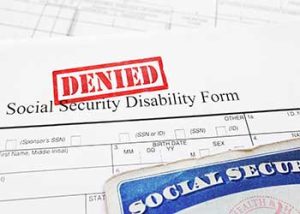What is the Social Security Disability Appeal Process?
Social Security Disability Appeal
When dealing with having your application for benefits denied, understanding the Social Security Disability appeals process is important. If your application is denied, you can appeal the decision. Let’s explore the stages of the Social Security Disability Appeal process more comprehensively and address some common questions along the way.
Steps of The Social Security Disability Appeal Process
If you disagree with the SSA’s decision, the first recourse is to request reconsideration. This involves a comprehensive review of the entire decision, including any aspects that may have initially favored you. The process allows for online appeals or mailing a completed form to your local Social Security office. It’s crucial to initiate the appeal within 60 days of receiving the initial notice.
Hearing By an Administrative Law Judge: Second Step
When reconsideration doesn’t resolve the issue, the next step is a hearing before an administrative law judge. This involves submitting a written request within 60 days of the reconsideration notice. Before the hearing, you or your representative can review your file and submit new evidence. The hearing can take various forms, including in-person, video, or telephone.
Appearing at the Hearing: It is crucial to appear at the scheduled hearing. Failure to attend may result in the loss of appeal rights and benefits.
Travel Assistance: For those whose hearing location is more than 75 miles from home, the SSA may cover reasonable travel costs.
Appeals Council Review: Third Step
Disagreeing with the judge’s decision leads to an appeal to the Appeals Council. Your appeal must be filed within 60 days of receiving the hearing decision. The Appeals Council may review your case or decide to do so independently. You may submit new evidence, but it must be relevant to the period on or before the hearing decision.
Council Action: The Appeals Council can grant, deny, or dismiss the request for review. If granted, it may issue a decision, consider the case for further action, or propose a decision that allows you to respond.
Federal Court: Fourth Step
If you disagree with the Appeals Council’s decision, you have the option to file a civil action with the U.S. District Court within 60 days of receiving their notice. The court reviews the evidence and the final agency decision, potentially sending the case back for a new hearing or directing the agency to award benefits.
How Long Does a Social Security Disability Appeal Take?
 The duration of a Social Security Disability Appeal can vary significantly. While reconsideration typically takes a few months, a hearing may extend the process. Appeals Council reviews and Federal Court actions can further contribute to the timeline. Hiring a Social Security Disability Lawyer can help speed up your case. They are familiar with the Social Security Disability Appeal process and can ensure everything is filed correctly.
The duration of a Social Security Disability Appeal can vary significantly. While reconsideration typically takes a few months, a hearing may extend the process. Appeals Council reviews and Federal Court actions can further contribute to the timeline. Hiring a Social Security Disability Lawyer can help speed up your case. They are familiar with the Social Security Disability Appeal process and can ensure everything is filed correctly.
What Are The Chances of Winning A Social Security Disability Reconsideration?
Many clients ask us how to find a social security disability federal appeal. Success rates at the reconsideration stage vary. Statistically, a significant number of claims are denied during this phase. However, presenting strong evidence and a well-prepared case can substantially increase the likelihood of a favorable outcome. If you want the best chances at winning a social security disability federal appeal, you will want to seek professional legal assistance. A social security disability lawyer with decades of experiences can assist you with the entire process can increase the chances of winning a Social Security Disability Reconsideration.
"*" indicates required fields
Do you have questions?
Want to qualify for disability?
This is New York Attorney Advertising. This website is designed for general information only. The information presented in this site should not be construed to be formal legal advice nor the formation of a lawyer/client relationship. We may rely on co-counsel for some or all of the cases. Prior results do not guarantee a similar outcome.




